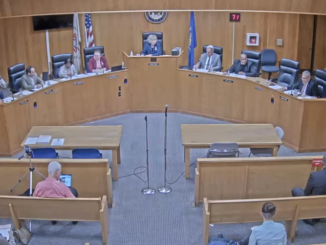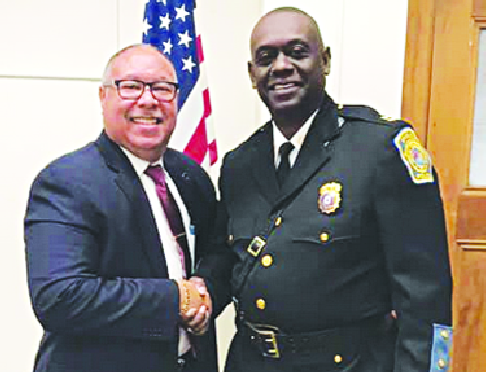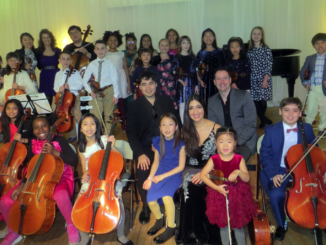
BY MICHAEL OLOHAN
OF NORTHERN VALLEY PRESS
While Leonia and the state Attorney General’s Office wage legal battle over whether a federal district court or state Superior Court should ultimately rule on Leonia’s ordinances restricting out-of-town motorists, Leonia introduced another ordinance Nov. 19 to close streets for up to 48 hours for “preservation of public safety, health and welfare.”
That ordinance is up for a public hearing and final vote on Monday, Dec. 3 in Leonia.
At Englewood’s City Council meeting Nov. 20, City Manager Ed Hynes said the attorney general filed a motion in federal court Nov. 16 to return the ongoing legal court case back to state Superior Court after a recent change of legal venue was requested by Leonia, and the case was moved to federal court.
A decision on moving the case back to Superior Court is due on Jan. 7, 2019, said U.S. District Court officials.
Hynes said Englewood’s effort to enter the case against Leonia “is still in limbo, we’re kind of like frozen in place and we’re following the lead of the Attorney General,” until the Jan. 9 federal court ruling, he said.
“We have all expectations the case will be remanded back to the state,” he added.
Hynes said the city’s special counsel and state Attorney General’s Office were aware of the newly introduced ordinance allowing temporary closures of streets by the Leonia mayor and chief of police.
That ordinance is up for a public hearing and final vote on Monday, Dec. 3 in Leonia.
At Englewood’s City Council meeting Nov. 20, City Manager Ed Hynes said the attorney general filed a motion in federal court Nov. 16 to return the ongoing legal court case back to state Superior Court after a recent change of legal venue was requested by Leonia, and the case was moved to federal court.
A decision on moving the case back to Superior Court is due on Jan. 7, 2019, said U.S. District Court officials.
Hynes said Englewood’s effort to enter the case against Leonia “is still in limbo, we’re kind of like frozen in place and we’re following the lead of the Attorney General,” until the Jan. 9 federal court ruling, he said.
“We have all expectations the case will be remanded back to the state,” he added.
Hynes said the city’s special counsel and state Attorney General’s Office were aware of the newly introduced ordinance allowing temporary closures of streets by the Leonia mayor and chief of police.
‘The ‘cold war’ continues’
“So the ‘cold war’ continues, this could be a way to get around the first ordinances which were questioned so we’ll keep a close watch on that,” Hynes said.
In the last six weeks, Leonia has requested its case be moved from Superior Court Judge Peter Bariso to the U.S. District Court, and both the state Attorney General’s Office and plaintiff Jacqueline Rosa subsequently opposed the move, requesting the case be returned to state Superior Court where it was originally heard by Bariso.
On Oct. 30, Leonia requested the removal of the lawsuit opposing its nearly year-long road closures—Rosa v. Leonia—to the U.S. District Court, possibly in response to a Superior Court ruling nullifying their road closure ordinances.
The case was moved to U.S. District Court Judge Esther Salas following the Leonia request.
‘Entirely appropriate’ change
Leonia Mayor Judah Zeigler defended moving the case to a federal court.
“This is entirely appropriate, since the challenges which are the basis of what we consider to be the frivolous complaint against our current ordinances are constitutional in nature, and therefore should be adjudicated in federal court,” he emailed Northern Valley Press.
He said the case needed to be argued in “front of a fair and impartial judicial authority … where the matter can be adjudicated strictly on the merits, (versus) the political power of those involved in the action. It is not surprising that the Attorney General is trying to have the matter remanded back to Superior Court; it is simply further proof of the politically motivated nature of this action,” wrote Zeigler.
Legal street fight
The borough said initially it was forced to enact the closures due to heavy cut-through traffic from out-of-town motorists—rerouted by traffic apps—when jam-ups occur at nearby George Washington Bridge.
In two separate rulings on Aug 30 and Oct. 12 by Bariso, he ruled against Leonia’s legal authority to restrict road access to non-resident motorists. Since January, the borough had posted signs restricting non-resident travel on 60 side streets nine hours per day, seven days per week.
On Oct. 12, Bariso told Leonia to cover its over 60 street signs restricting non-resident traffic and to stop enforcing its ordinances limiting non-resident access. On Aug. 30, Bariso had invalidated Leonia’s road-closure ordinances but Leonia claimed the judge’s decision was a victory because it only invalidated street closures on roads adjoining state roads or highways, specifically Grand Avenue and Route 46.
The borough then passed two new ordinances Sept. 17 restricting non-resident access, sending the ordinance that restricted roads adjacent to state roads to the state Department of Transportation for final approval. No action was taken by NJDOT.
Leonia’s mayor sees no ‘war’
Zeigler said when he met in Englewood in February to discuss city residents’ concerns, he met with the city manager and council and noted 84 percent of community concerns were “contained to residents of a single block”—16 of 19 speakers were from one block, and two of the three others resided within one block, he said.
“The borough of Leonia doesn’t understand why the City of Englewood considers itself in a ‘Cold War’ with our community, or frankly why they consider us to be in any ‘war’ at all,” emailed Zeigler Nov. 26 responding to Hynes’ comments.
He said a solution was proposed for Ridgeland Terrace residents and no response was received from them. Instead, he said, Englewood hired a special counsel “to attempt to insert itself in a legal action pending in federal court. That special counsel spoke at a meeting of [Leonia’s Council],” said Zeigler, “and did not provide any specific areas of concern with regard to the ordinances we have adopted,” he emailed.
Zeigler said Leonia “has always desired to work collaboratively with any governmental agency…to address the paralyzing commuter traffic that threatens the safety of all who live, work and do business in our community.”
He charged Englewood “doesn’t share that same commitment…seeming to prefer instead to keep silent and address any issues they may have—which again have yet to be shared with us—by spending taxpayer dollars on unnecessary legal expenses,” emailed Zeigler.
‘Yet again’
In a Facebook post Nov. 20 alerting concerned Englewood residents to Leonia’s legal machinations, Ridgeland Terrace resident Diane Jansen noted “Leonia is at it Yet Again!”
“Leonia must not have liked New Jersey Superior Court Judge Bariso’s most recent decisions in the Rosa v. Leonia case,” she wrote.
“As a tactic on Oct. 30, 2018, Leonia requested the removal of the case from [state] Superior Court to U.S. District Court. The case was assigned to [federal] District Court Judge Esther Salas,” she noted.
Jansen spoke at several meetings following the closures in January, citing complaints from Englewood residents of Ridgeland Terrace, Jones Road and Overlook Place inconvenienced and harmed by Leonia’s closures. Following numerous appeals, the City Council hired a special counsel, Donald Klein of Weiner Law Group, Parsippany, to represent the city’s interests against Leonia.
Rosa, the lawsuit’s plaintiff, who is an Edgewater resident and Ridgewood attorney, filed the original lawsuit against Leonia within weeks of its road restrictions, and was later joined by the state Attorney General’s Office.



